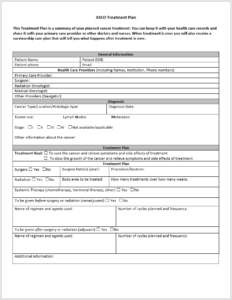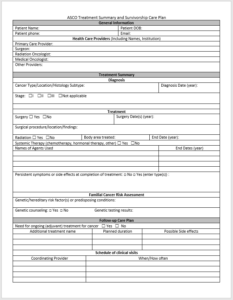NCCS is now Cancer Nation. Find out more about our next chapter. Join Us
Planning Your Patient’s Care
One way to help make sure you and your patient understand each other is by using cancer care plans. In an NCCS and Sanofi-Aventis study conducted online within the United States by Harris Interactive in 2007, we found that communication and care planning play an essential role in cancer care:
- Only one third (35 percent) of survey participants received a written summary of treatment when care ended
- Of those who did not receive a written care plan outlining their treatment before it began, 78 percent said having one would have helped them ask appropriate questions about what side effects to expect from treatment
Cancer care plans are roadmaps that make sure you and your patients know where they are going and how to get there. This roadmap should be discussed with other members of the patients’ health care team and can be shared with other health professionals involved in their care, such as primary care doctors, radiologists and surgeons. Cancer care plans are useful whether someone is newly diagnosed, making the transition from active treatment, or changing the course of treatment.
Cancer Care Plans Should Have Three Parts:
- Treatment Care Plan – This plan should be discussed before beginning treatment and can help guide patients as they talk with doctors and other members of the health care team about what is important to them and any concerns they may have. It will help when talking about treatment options and possible side effects. The treatment plan can be shared with other doctors patients might see for cancer treatment or for any other health care needs.
- Treatment Summary – The treatment summary should be provided once your patient transitions from active treatment and can be shared with other doctors and health care providers. It provides a list of medicines the patient is taking, describes any ongoing issues that need to be addressed, and describes the cancer care he or she has received.
- Follow-up Survivorship Care Plan – This plan will help map out your patients follow-up care upon the completion of treatment. Cancer survivors need to be monitored for the rest of their lives and have different health care needs than before they were diagnosed. The Follow-Up Survivorship Care Plan helps to ensure that everyone involved in the patient’s care knows what follow-up is needed, when it is needed, and who he or she should see for that care.
Survivorship Care Planning
During your patients’ cancer treatment, you’re their lifeline. For them, it is a time with many questions. Your care gives your patients the hope and opportunity to live beyond cancer.
Unfortunately, many of these patients feel that once active care is complete, they are on their own. During treatment, they were surrounded by constant care from you and your team, but now they are alone with questions about what’s next. Survivors need to be assured the quality care they received during active treatment will continue.
A Survivorship Care Plan is a coordinated post-treatment plan between the Survivor’s oncology team, a primary care physician and other health care professionals. The oncologist creates a summary of the Survivor’s treatment and includes direction for future care.
A typical Survivorship Care Plan includes:
- Patient diagnosis and treatment summary
- Best schedule for follow-up tests
- Information on late- and long-term effects of cancer treatment
- List of symptoms to look for
- List of support resources
This comprehensive medical summary, given to the Survivor and their primary care physician, helps support better survivorship care. The plan includes important information for monitoring possible secondary cancers and any late- or long-term effects of the Survivor’s cancer treatment. A Survivorship Care Plan also relieves a Survivor from having to recall all the details of treatment and ensures all future health care providers are working as a team for the Survivor’s care.
Customizable Care Planning Templates
Below are care planning templates from the American Society of Clinical Oncology (ASCO) that can be used for patients with a history of any type of cancer. For more cancer-specific templates and guidelines on practitioner use, visit ASCO’s care planning page.
Note: Templates are in Microsoft Word document .docx format.
*Includes a Treatment Summary




